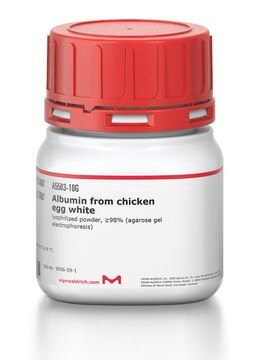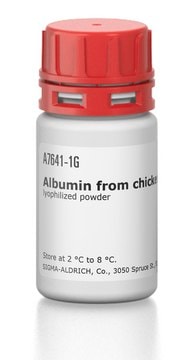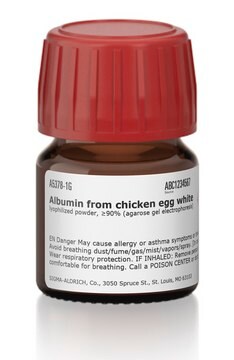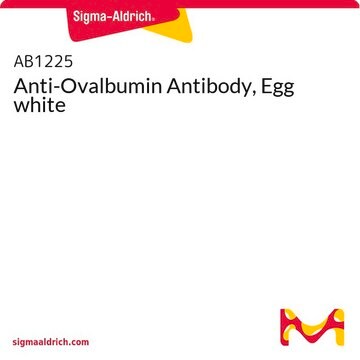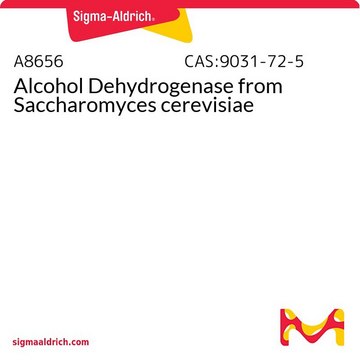ZRB2668
Anti-Ovalbumin Antibody, clone 3G13 ZooMAb® Rabbit Monoclonal

recombinant, expressed in HEK 293 cells
Synonym(s):
Allergen Gal d II, Egg albumin, Plakalbumin
About This Item
Recommended Products
biological source
rabbit
Quality Level
recombinant
expressed in HEK 293 cells
conjugate
unconjugated
antibody form
purified antibody
antibody product type
primary antibodies
clone
3G13, recombinant monoclonal
description
recombinant, expressed in HEK 293 cells
product line
ZooMAb® learn more
form
lyophilized
mol wt
calculated mol wt 42.88 kDa
observed mol wt ~43 kDa
purified by
using Protein A
species reactivity
chicken
packaging
antibody small pack of 25
enhanced validation
recombinant expression
Learn more about Antibody Enhanced Validation
technique(s)
ELISA: suitable
affinity binding assay: suitable
western blot: suitable
isotype
IgG
epitope sequence
Unknown
Protein ID accession no.
UniProt accession no.
shipped in
ambient
storage temp.
2-8°C
Gene Information
chicken ... SERPINB14(396058)
Related Categories
General description
Specificity
Immunogen
Application
Evaluated by Western Blotting in Chicken egg ovalbumin.
Western Blotting Analysis: A 1:10,000 dilution of this antibody detected Chicken egg ovalbumin.
Tested Applications
Western Blotting Analysis: A 1:1,000 dilution from a representative lot detected recombinant Chicken egg Ovalbumin..
Affinity Binding Assay Analysis: A representative lot of this antibody bound Ovalbumin with a KD of 2.6 x 10-7 in an affinity binding assay.
Enzyme Immunoassay (ELISA) Analysis: Serial of dilutions from a representative lot detected Ovalbumin.
Note: Actual optimal working dilutions must be determined by end user as specimens, and experimental conditions may vary with the end user.
Target description
Physical form
Reconstitution
Storage and Stability
Legal Information
Disclaimer
Not finding the right product?
Try our Product Selector Tool.
Storage Class
11 - Combustible Solids
wgk_germany
WGK 1
flash_point_f
Not applicable
flash_point_c
Not applicable
Certificates of Analysis (COA)
Search for Certificates of Analysis (COA) by entering the products Lot/Batch Number. Lot and Batch Numbers can be found on a product’s label following the words ‘Lot’ or ‘Batch’.
Already Own This Product?
Find documentation for the products that you have recently purchased in the Document Library.
Our team of scientists has experience in all areas of research including Life Science, Material Science, Chemical Synthesis, Chromatography, Analytical and many others.
Contact Technical Service